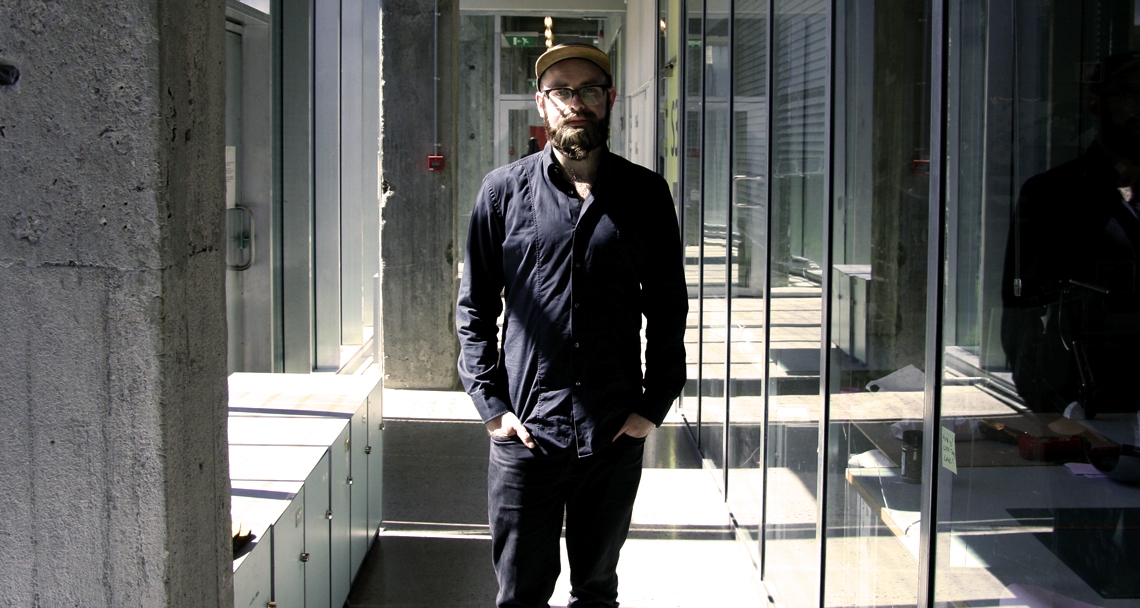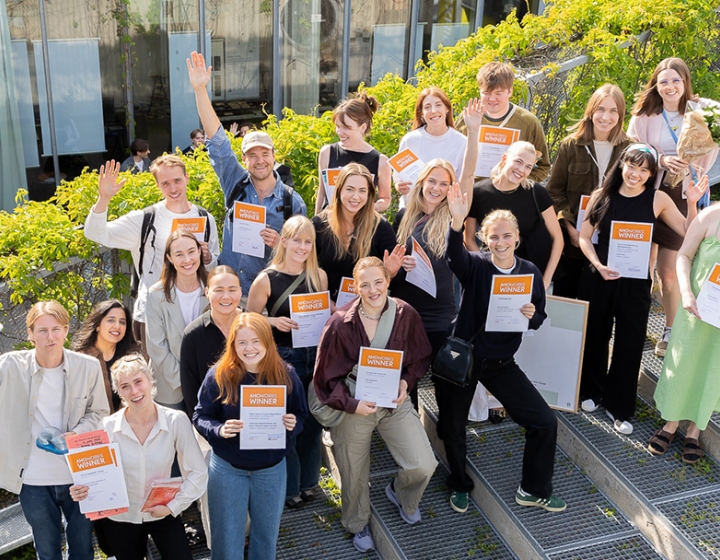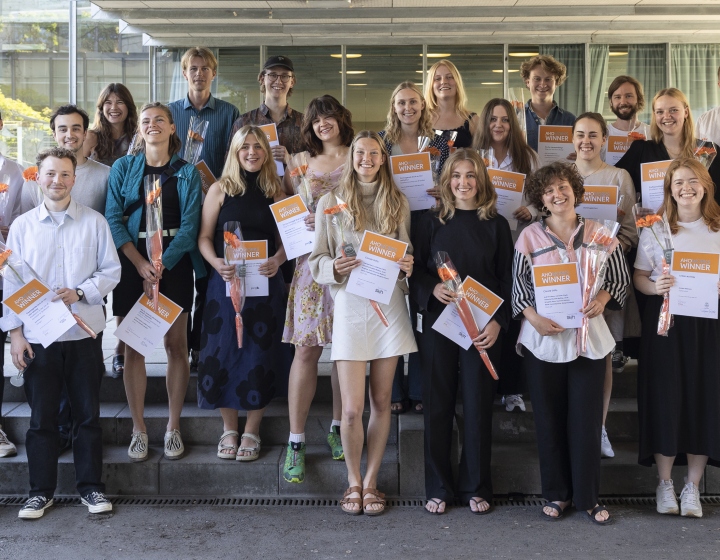Student chat: Simon Heidenreich
We have talked to Simon Heidenreich, a fifth year student from Munich, Germany. He studies architecture at the Bauhaus University in Weimar and is currently enrolled at AHO for his exchange year.
Which courses are you taking and what are you working on here at AHO?
This semester I'm attending the ACDL (Advanced Computational Design Laboratory) course, which is pretty stressful but also very interesting. We get a lot of input towards new design approaches and have a lot of different workshops.
The design brief itself is pretty free. We were given three plots to choose from — one in Slottsparken, one beside Børsen in Bjørvika and the one I chose, the Gunerius Senter in Brugata. The task is to develop a building whose design is aided by parametric processes and informed by a variety of computational analyses — solar radiation, structural analysis, climatic modelling, optimizing spatial organization via algorithms, to name a few. Furthermore it has to house multiple programs over the course of the 24-hour-day that can share a space.
They’re pushing us in finding parameters that are sort of obscure, for then to use them to develop a form. We're also encouraged to try to combine programs that, on first glance, don't seem to go together.
When I was visiting the area I recognised that it’s heavily populated and traffic-laden; many people change lines here throughout the day. The area has the second highest pedestrian frequency in Oslo. There’s also a lot of heroin addicts there due to the vicinity to the Legevakt and the central methadone disbursal. I read into the therapeutic properties of architecture and drug therapy, so now my design features therapy facilities and apartments. I'm trying to include the addicts rather than just relocate them to another spot.
According to some papers I read about the therapy of addicts, playing theatre is a promising means of rehabilitation and coping with addiction as they can role-play, talk and think about it in a way that is consciously disconnected from their person, but helps on a subconscious level. I added a theatre in the basement that’s located in the old loading bay of the shopping center using the slope of the ramp for seating and the loading dock itself for a stage.
On the top there is a big parking lot which I’m connecting to the other roof-slabs with ramps to make it usable for urban farming with open plant trays and greenhouses. When patients are in a normal mental institution, they wake up, get their medication, exist for the day before going back to bed. Which provingly either ends in them taking drugs again or heavy depression. They need purpose. So I thought about having an urban farming project where they work during the day taking care of the plants and crops, so they can go back to bed and think “I achieved something today”.
Why did you choose to apply to AHO, and what are the differences between AHO and Bauhaus University?
A guy from my school studied here on exchange a couple of years ago. He told me that even as an architecture student you can use the metal workshop — which we're sadly not allowed into at my school — and learn all sorts of skills, like welding. I always wanted to learn how to weld, so I applied here.
I love craft and working with my hands. So every time I have a couple of free minutes I sneak into the workshops and build something; I recently built a desk, for example. At the moment I use the lathes and mills and build little contraptions to practise and take as many useful skills as possible back to Germany.
What I really like here is the flat hierarchies, you’re sort of on a first name basis with your professors. Making jokes with the professors is a rare occurence at my school. The professors are up here and students are down there — depends on the professor, of course. It’s students vs. professors in a way, which on one side can be quite harsh during critiques, people regularly leave the room crying. On the other hand it really enhances student-life a lot as you really have to pull together.
What do you want for your future?
I’m pretty certain that I will not be an architect in the classical sense. I previously worked as a graphic designer, so I really like small scales and being very pedantic about it.
Having a small firm that does really precise small projects like saunas, single family dwellings or cabins would be great, and I would really like to be involved in the building process. That is quite a romantic notion and I have no idea if it works out. Maybe I will end up as a product designer, furniture builder or a graphic designer again. I have a general interest in a lot of fields, so I don’t want to narrow it down too much. If nothing works out I'll just open a bakery-workshop-café-design-recordstore-office in the middle of nowhere. Who knows.
This semester I'm attending the ACDL (Advanced Computational Design Laboratory) course, which is pretty stressful but also very interesting. We get a lot of input towards new design approaches and have a lot of different workshops.
The design brief itself is pretty free. We were given three plots to choose from — one in Slottsparken, one beside Børsen in Bjørvika and the one I chose, the Gunerius Senter in Brugata. The task is to develop a building whose design is aided by parametric processes and informed by a variety of computational analyses — solar radiation, structural analysis, climatic modelling, optimizing spatial organization via algorithms, to name a few. Furthermore it has to house multiple programs over the course of the 24-hour-day that can share a space.
They’re pushing us in finding parameters that are sort of obscure, for then to use them to develop a form. We're also encouraged to try to combine programs that, on first glance, don't seem to go together.
When I was visiting the area I recognised that it’s heavily populated and traffic-laden; many people change lines here throughout the day. The area has the second highest pedestrian frequency in Oslo. There’s also a lot of heroin addicts there due to the vicinity to the Legevakt and the central methadone disbursal. I read into the therapeutic properties of architecture and drug therapy, so now my design features therapy facilities and apartments. I'm trying to include the addicts rather than just relocate them to another spot.
According to some papers I read about the therapy of addicts, playing theatre is a promising means of rehabilitation and coping with addiction as they can role-play, talk and think about it in a way that is consciously disconnected from their person, but helps on a subconscious level. I added a theatre in the basement that’s located in the old loading bay of the shopping center using the slope of the ramp for seating and the loading dock itself for a stage.
On the top there is a big parking lot which I’m connecting to the other roof-slabs with ramps to make it usable for urban farming with open plant trays and greenhouses. When patients are in a normal mental institution, they wake up, get their medication, exist for the day before going back to bed. Which provingly either ends in them taking drugs again or heavy depression. They need purpose. So I thought about having an urban farming project where they work during the day taking care of the plants and crops, so they can go back to bed and think “I achieved something today”.
Why did you choose to apply to AHO, and what are the differences between AHO and Bauhaus University?
A guy from my school studied here on exchange a couple of years ago. He told me that even as an architecture student you can use the metal workshop — which we're sadly not allowed into at my school — and learn all sorts of skills, like welding. I always wanted to learn how to weld, so I applied here.
I love craft and working with my hands. So every time I have a couple of free minutes I sneak into the workshops and build something; I recently built a desk, for example. At the moment I use the lathes and mills and build little contraptions to practise and take as many useful skills as possible back to Germany.
What I really like here is the flat hierarchies, you’re sort of on a first name basis with your professors. Making jokes with the professors is a rare occurence at my school. The professors are up here and students are down there — depends on the professor, of course. It’s students vs. professors in a way, which on one side can be quite harsh during critiques, people regularly leave the room crying. On the other hand it really enhances student-life a lot as you really have to pull together.
What do you want for your future?
I’m pretty certain that I will not be an architect in the classical sense. I previously worked as a graphic designer, so I really like small scales and being very pedantic about it.
Having a small firm that does really precise small projects like saunas, single family dwellings or cabins would be great, and I would really like to be involved in the building process. That is quite a romantic notion and I have no idea if it works out. Maybe I will end up as a product designer, furniture builder or a graphic designer again. I have a general interest in a lot of fields, so I don’t want to narrow it down too much. If nothing works out I'll just open a bakery-workshop-café-design-recordstore-office in the middle of nowhere. Who knows.



